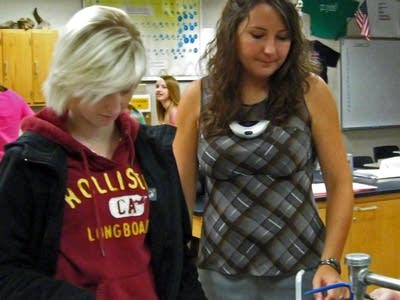High schools push nanotech, a potential job machine

Scientists are using nanotechology in everything from improved cancer treatments, to more effective sunscreen, but surveys show high school students don't know much about nanotechnology.
The National Science Foundation is funding a pilot project to teach high school students the basics of nanotechnology. A teacher in Grand Forks, N.D. is among 21 teachers nationwide who are spending extra time on nanotech.
Nanotechnology is the science of creating structures at the molecular level. The government predicts nanotech will create hundreds of thousands of new jobs in the next five years, but some experts say schools aren't doing enough to educate students about nanotech.
"We found their understanding was very surface level and even included misconceptions, they associated the Nano iPod, for instance, with nanotechnology," said John Ristvey, a senior director at Mid-Continent Research for Education and Learning in Denver.
Create a More Connected Minnesota
MPR News is your trusted resource for the news you need. With your support, MPR News brings accessible, courageous journalism and authentic conversation to everyone - free of paywalls and barriers. Your gift makes a difference.
Ristvey said it's not only students who don't understand nanotechnology. Many teachers are behind the curve, which is why the non-profit organization is running a pilot project to bring nanotechnology into classrooms.
Reyne Armbrust, who teaches chemistry at Red River High School in Grand Forks, is part of the project. The idea is to incorporate nanotechnology across the science curriculum. (St. Paul Arlington High School science teacher Lindsay Lowther is also part of the pilot project.)
On a recent school day, Armbrust's lesson with a class of junior and senior chemistry students is about contrast between measuring items the students are familiar with and nano-scale objects which they can't see.
"When I tell you there's 10 million nanometers in one centimeter, you know what a centimeter is, the little marking on your ruler. And the little dashes in between there are the millimeters. Can you imagine ten million little dashes in there?" Armburst said to her students.
Armbrust spent two weeks this summer learning about nanotechnology. She said nanotech affects all areas of science. For example, at the nano-scale, the melting point of a metal might change dramatically, or a non-toxic substance might become toxic.
Armbrust thinks students need to understand how molecular manufacturing changes the world around them.
"Nanotechnology isn't just a chapter in a book. It's something we're going to incorporate throughout the year," she said. "If we can incorporate it little by little throughout the year they're going to have a better understanding."
Armbrust said her students will likely live in a world changed by nanotechnology. She said it might bring great advances in medical treatment or electronic products, but it could also create health risks or environmental threats. She thinks it's critical high school students have a basic knowledge of the science.
"A lot of ethical issues are going to come up involving nanotechnology and how we use it in our society, so I feel like it's my job to produce well-rounded citizens," she said.
Those students might be in the minority. John Ristvey at Mid-continent Research for Education and Learning said most science curricula gloss over nanotech. Ristvey thinks American students are falling behind in the area of emerging science. He said many other countries are emphasizing nanotechnology in the classroom.
"In the United States because we have such an overburdened curriculum with many many topics being taught at a surface level, there's not a good place to include it," he said. "That's why I think we are behind the 8 ball, so to speak, in the United States."
The 21 teachers will test the nanotech curriculum in their classrooms this year. Ristvey said the goal is to make curriculum materials available online to all interested science teachers next year.
